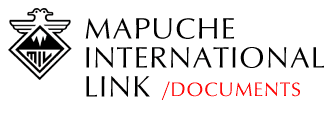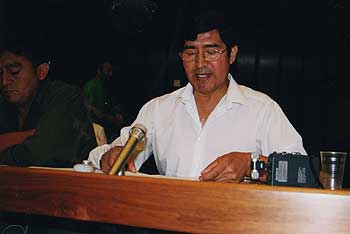
 |
|
|
| Home
| Front Page
| News
| Documents |
Environmental
| Archive
| Discussion
Point Links | About Us |
|
Document presented to the Sub-Commission by Mr. Reynaldo Mariqueo on the situation of the Mapuche people COMMISSION ON HUMAN RIGHTS Document presented by Incomindios (International Committee for the Indigenous Peoples of the Americas)
Mr Chairman The violation of the fundamental freedoms and human rights of the Mapuche people both individually and collectively has given rise to long-standing concerns on the part of various non-governmental organizations. Indeed, over the last few years several of them have initiated fact finding missions in the Wallmapu (Mapuche Territory ) so as to investigate the persistent complaints made by Mapuche organizations and communities concerning the violation of their basic rights as guaranteed by the regulations of international law. Amnesty International, The International Federation of Human Rights, Human Rights Watch and the World Organization Against Torture have all drawn up reports expressing their concern and/or have made recommendations to the Chilean authorities pertaining to the so-called "Mapuche conflict". For his part, Mr Stavenhagen, the Special Rapporteur on Indigenous Issues of the UN Human Rights Commission, has made specific recommendations after having observed first-hand the dramatic situation facing Mapuche communities and their leaders during his visit to Chile in July 2003. In a letter addressed to the Chilean Government on the 19 th July this year, Mr Stavenhagen reiterated his concern at the "disproportionate indictments hanging over the traditional authorities (Chief Pascual Pichún and Chief Aniceto Norín) considering the acts with which they are charged under the current Penal Code. "He also warns that such gaps between the nature of incidents and the sentences sought to punish them could be interpreted as an "act of persecution of the Mapuche social movement in the country". Just like the use of anti-terrorist legislation in the context of the Mapuche conflict. The Mapuche authorities referred to by Mr Stavenhagen were acquitted for the second time by a Chilean tribunal on the 22nd July this year, but as happened previously, their imprisonment continues nonetheless. The Chilean Government has ignored the concerns of the international community and far from seeking a just political solution and responding to the demands of Mapuche communities, it has responded with indiscriminate oppression and the application of repressive legislation introduced during the dictatorship of General Pinochet. One of the most questionable legal matters is the Chilean Government's use of anti-terrorist laws against Mapuche leaders and authorities. Such laws may be applied in relation to crimes against the person, as described in the International Conventions on this matter, but in the case of Chile, these laws are being used to punish the Mapuche peoples' acts of protest including even their simple gatherings, thus denying them their fundamental right to freedom of association. This situation implies that the violation of the human rights of the Mapuche people is dissimulated behind an appearance of legality, reflected in the clear abuse of power by the Chilean police, who do nothing but intimidate the Mapuche people both physically and psychologically, including children, women and the elderly. If I may, Mr Chairman, I would like to briefly illustrate this situation so as to expose the persecution and the legal 'set-ups' directed against Mapuche leaders. Here are some examples:
Mr Chairman, in many cases Mapuche prisoners are tried under laws that are not appropriate to the crime in question and their legal rights are diminished by the use of these laws. They are tried by juries and judges whose impartiality and independence is questionable, as demonstrated by the annulment of trials where accused Mapuches were found not guilty, or by the barring of judges who ruled in their favour, a situation reflected in the letter sent to the Chilean president on the 10th June of this year by the Coordination of Mapuche Organizations and Territorial Identities. This shows us, Mr Chairman, that the action of the Chilean legal system greatly discredited among the Mapuche community and that the administration of justice under Chilean democracy is seriously under question. The territorial conflict referred to by those human rights organizations in their reports, has been ongoing since the annexation of Wallmapu (Mapuche Territory) by the use of armed force by the Republics of Chile and Argentina since 1860 to 1885, when the Mapuches' armed resistance was crushed by the superior military power of these neighbouring countries. During 120 years of occupation of our land, the Republics of Chile and Argentina have systematically exorcised their policies of genocide and cultural assimilation. The plundering of our land and resources continues, condemning us to the worst poverty in all our history. The democratic system of government and the economic progress of Chile do not seem to have changed the economic and social situations of Mapuche communities. Finally, I should report that Chile does not recognise the right to self-determination of the Mapuche people nor does it recognise the existence of the Mapuche Nation in its constitution, and that it refuses to ratify Convention 169 of the International Labour Organization on Indigenous and Tribal Peoples. In light of the aforementioned facts, we call upon the Sub-Commission to act in accordance with its mandate and to put pressure on the Chilean Government to end its repressive policies against the Mapuche people, to ratify international conventions and to put into effect the universally recognised regulations on human rights. Many thanks, Mr Chairman. Reynaldo Mariqueo Translated by Anna Harvey |
| |
||
|
||
